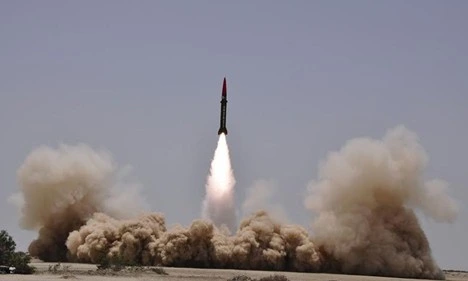The Government of Pakistan has given a categorical condemnation of the publication of British tabloid body Daily Mail over a fabricated and potentially dangerous story on nuclear threats. This erupted into a big controversy when on June 13, 2025, the Daily Mail broke a sensational story that Pakistan had promised Iran that she would respond through blowing off Israel with a nuclear weapon in case Iran was attacked with any nuclear weapon. They referred to a video by an Iranian IRGC official Mohsen Rezaei, in which, supposedly, such an assurance was mentioned. But the Foreign Minister of Pakistan, Ishaq Dar, was fast to diffuse to the Senate to condemn the report, which he called as a doctored video discussed as irresponsible, false news using artificial intelligence.
The essence of the story published in the Daily Mail was based on a video, which was neither verified nor, as it was found out with the help independent fact-checking solutions in iVerify Pakistan, was not real but was staged with the help of artificial intelligence. The video under consideration was supposed to depict Rezaei presenting statements on some secret Pakistani promise to Iran concerning the strike back with nuclear weapons. Nonetheless, such claims have not been made either by the Government of Iran or the official Iranian channels. This lack of corroboration was instantaneously mentioned by the foreign office of Pakistan, which further weakened the validity of the report released by the daily mail.
Foreign Minister Ishaq Dar was not diplomatic when it comes to dealing with the misinformation. Addressing the Senate in Pakistan, Dar insisted that the video was totally fictional and that Pakistan had not given any such promise of nuclear supply to Iran or the rest of the world. The fact that the Daily Mail had not actually ensured the video was genuine before giving out a story, had caused unnecessary panic as well as confusion on the international platforms, he stated. Dar cautioned that this irresponsible coverage on issues of nuclear stuff could reap devastating effects not only in Pakistan but also in general security of the world as a whole.
The Government of Pakistan has gone out to state distinctly that it has drawn a policy of strategic restraint and responsible diplomacy. The authority of the country emphasized that to incite hypothetical scenarios of nuclear war based on fake information is a heinous disregard of the journalist code of ethics. Considering the injurious essence of the article, Pakistan Foreign Office is now said to take some legal recourse, such as the charge of defamation and misinformation, against the Daily Mail.
In addition to the direct geopolitical impacts, the actions of the publication have called once more into question the practices of the Daily Mail to the level of journalism, particularly as it applies to reporting on Pakistan. The paper has a recorded record of publishing misleading, sensational stories against the country. It also incorrectly charged Maryam Nawaz, (daughter of ex-Prime Minister Nawaz Sharif), with corruption in 2016. This assertion resulted in the effective defamation suit in the UK court so as to not only discredit the initial article but also compel the Daily Mail to publicly owned apology and pay damages.
More recently in March 2025, the same newspaper made a false report that 50 hostages had been killed when Pakistani rescue operations took place in a train. The same was the case with that story and Pakistani authorities later proved this story completely false as well, however the fact that this eerie story was able to go viral and spread even further in the realm of social media once again explains the hazard of ill-reprehension journalism in the digital world.
It is unlikely that the recent fabrication of a nuclear war would rank on the list of the worst examples of the destabilizing effects of the misinformation that has not been properly verified by major media houses than the one that occurred recently. Due to the sensitive character of the Middle Eastern and South Asian nuclear politics, in particular, the proliferation of such disinformation is highly disturbing. The leadership of Pakistan has well addressed that the activities by the Daily Mail is not only sinful on its national sovereignty but a careless shot on the global stability.
Pakistan has also condemned the said report with even a number of observers and independent media watchdog organizations saying that this case indicates the dire need to enhance editorial controls and verification practices in media companies around the world. In the era of the disinformation where fake news can be created very quickly with the help of AI, responsible journalism plays an even more significant role. The Daily Mail and other channels should assume a bigger obligation of vetting and verifying the sources prior to publishing content that may be inflammatory.
The hard-line policy adopted by the Foreign Office and the potential use of legal options make another powerful statement: Pakistan will not accept disseminating lies that jeopardise its national security or negatively imprint on its image at the international arena. This episode is also the reminder of the astronomical extent of the influence of media upon the perception and the necessity to exercise such power with integrity.
The disclosure of an unfounded and hysterical claim of nuclear threats by the Daily Mail has not only compromised the credibility of the newspaper but also threatens the geopolitical stability in a big way. The paper not only ruined the truth and accountability by publishing an AI-generated doctored video but also matter of fatly amplified it without confirming it. The ferocious retort of Pakistan, based on the analysis and attempts of legal prosecution, is not only the echo of a universal need demanding the responsibility of media in the world that becomes more and more connected and volatile.








